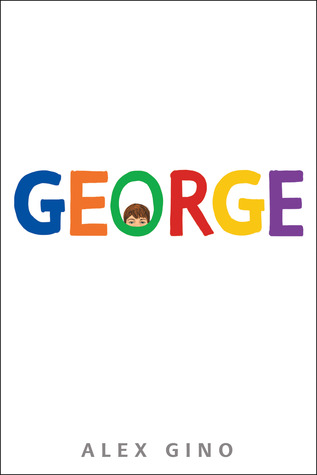Guest review by Tess Goldwasser:
There are four things I want you to know about George by Alex Gino.
1. George is an
important book.
 George is a book
about George, a boy who is actually a girl. Simply put: George’s outside
doesn’t match her inside. She’s a girl trapped, for all intents and purposes,
in a boy’s body. George is transgender, and this is hard for her, as you can
imagine. Her fourth grade class is performing a play of Charlotte’s Web and George wants to play Charlotte more than
anything. But the part is for a girl, and the only person who knows George is
really a girl… is George… for now… Dr. Jamie Campbell Naidoo once said to me: books
should be mirrors and windows. Good literature should reflect our personal
experiences, or offer new perspectives on the experiences of those who are
different from us. George will be a
mirror or a window to whomever picks it up, and this is important. Dialogue
about the transgender experience is important. We should be striving to
understand and accept one another.
George is a book
about George, a boy who is actually a girl. Simply put: George’s outside
doesn’t match her inside. She’s a girl trapped, for all intents and purposes,
in a boy’s body. George is transgender, and this is hard for her, as you can
imagine. Her fourth grade class is performing a play of Charlotte’s Web and George wants to play Charlotte more than
anything. But the part is for a girl, and the only person who knows George is
really a girl… is George… for now… Dr. Jamie Campbell Naidoo once said to me: books
should be mirrors and windows. Good literature should reflect our personal
experiences, or offer new perspectives on the experiences of those who are
different from us. George will be a
mirror or a window to whomever picks it up, and this is important. Dialogue
about the transgender experience is important. We should be striving to
understand and accept one another.
2. George is a
controversial book.
Many will question whether a book about the transgender
experience is appropriate for children. It’s a valid question. Are books about
slavery appropriate for children? Are books about the holocaust appropriate for
children? Are books about Hurricane Katrina appropriate for children? Are books
about beloved pets/friends/family members dying appropriate for children? All
of these questions are up for debate. I’ll admit there were parts of George that made me uncomfortable, parts
that made me wonder: Will a child get this? And if so will it upset them?
Ultimately, I feel it’s okay for kids to read things they may not fully
understand, and it’s okay for kids to read things that might make them upset.
Reading the experiences of characters, and having feelings about them, makes a
reader compassionate, and I want the world to be filled with compassionate
readers. (And for the kid who is actually living the transgender experience, I
believe it’s indubitably 100% appropriate.)
3. George is a
painful book.
There are parts of George
that are heartbreaking. The conflict between what society expects of George,
and what she feels inside is visceral for any sensitive reader. I found the
suspense of wondering whether or not George will come out to her loved ones,
and whether or not they will accept her, to be downright spine tingling. I lost
count of the times I wanted to reach into the book and give George a comforting
hug. Despite the book's relatively short length, I wouldn't categorize it as a
light read by any means. At one point George says she feels like the
butterflies in her stomach have butterflies in their stomachs and all I could
think was "YASSS GURL I KNOW!"
4. George is a
joyful book.
A colleague, Paula Willey, described George
to me as "this year's Wonder"
(referencing the uplifting 2012 novel by R.J. Palacio) which caused me to
immediately pick it up, because I love books that make you triumphantly pump
your fist in the air at the end. George, against the odds, is one of these
books. I don't want to spoil the ending for you, but I've never been so happy
for someone going to the bathroom in my life. I don't know how authentic the
ending is, how many transgender people get to have days like the days George
has as she finally embraces her inner self. I hope they do because it was
lovely to read, like a fairy tale come true.
I don’t know how much attention this is getting from the
Newbery committee. I hope some. I presume it’s getting a lot of attention from
the ALA Stonewall Book Award committee. But whether it wins any awards at all
is inconsequential to me. What will be most important about this book is that
it will hopefully find its way to the readers who need it. (After all, the book
is dedicated to “you”)
Tess Goldwasser is a magical ukelele-playing octopus in the guise of a children's librarian. She has served on the Stonewall Book Award Committee and the GLBTRT News Committee, and she is currently chairing the GLBTRT Advocacy Committee.


